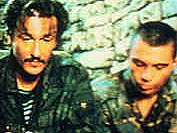|
|
|
|
Prisoner
of the Mountains
|
 |
|
It is a classic set-up: two prisoners of very different ages and personality-types who chained together must negotiate a wild terrain ravaged by war and general disorder. Sacha (Oleg Menshikov) and Vania (Sergei Bodrov, Jnr) are two Russian soldiers taken hostage in the midst of the Chechen-Russian war. While they wait in agony for a hostage exchange to take place, these two characters build a fragile relationship with each other, and with several of their captors and their families. The only traces of humour in this tale are jet black. Director Sergei Bodrov takes a long, hard look at the descent into barbarism that occurs on both sides of such a conflict. Sacha and Vania becomes pawns in a game that seems to have little to do with the sanctity of human life or the prospect for national peace, and everything to do with petty bureaucratic dysfunctioning, and base opportunism. It is tempting – if also somewhat foolhardy – to speculate on the characteristics of a Russian style in cinema, on the basis of the few films we see from that part of the world. It is a style nothing like the Hollywood norm. Like Burnt by the Sun (1994), Prisoner of the Mountains is a slow, meandering, seemingly shapeless film, much given to the static, heavy-handed reiteration of its basic conflicts. There are flashes of anti-naturalism amidst the general grind and crawl of this mode: unannounced moments of magic realism; sudden ellipses at high points of narrative tension; odd, contemplative vignettes given over to a song or a landscape. These departures are striking but they do not lift the film from its general turgidity. Bodrov's subject is the madness and atrocity of war. His righteous anger leads him to a distanced style that eschews any opportunity for violent spectacle. Unlike more daring and masterful filmmakers such as John Boorman or Emir Kusturica, Bodrov does not admit to the thrill, much less the lyricism of war. His too-measured, didactic approach weakens the impact of the story. One warning to filmgoers is in order. The trailer for this movie suggests that, however grim its premise, it moves towards an uplifting, life-affirming finale. Although this is to some extent a film about survival and hope, it is equally – perhaps even more so – a caustic and despairing eulogy for the lives lost and relationships severed because of war. True to the spirit of his national cinema, Bodrov's aim is hardly to paint a feel-good gloss over this collective trauma. MORE Russian cinema: The Thief, The Return © Adrian Martin June 1997 |
![]()